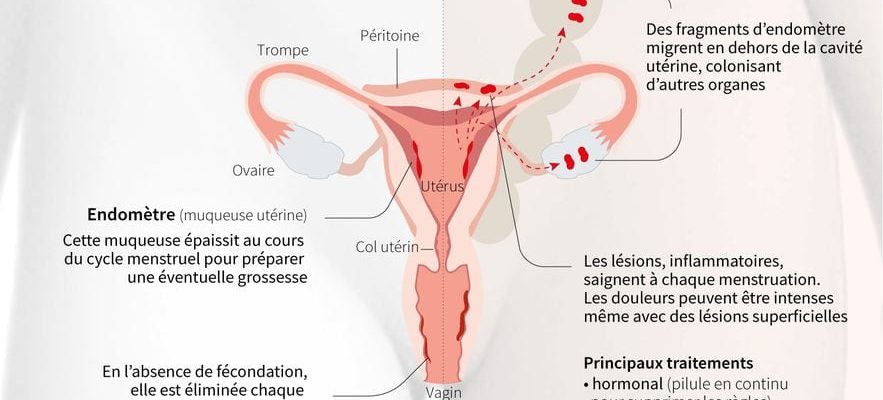Even today, it is diagnosed, often by chance, with an average delay of seven years. To remedy this, the government is targeting 2025 for the provision and reimbursement of a saliva test to detect endometriosis, indicated Thursday March 7, Catherine Vautrin, Minister of Labor, Health and Solidarity. “This is our objective”, but “this requires a final validation by the High Health Authority”, declared Catherine Vautrin on France 2.
Before arriving at reimbursement for the saliva test from the French company Ziwig, “which costs around 1,000 euros” according to the minister, we must await the results of a new clinical study on 3,000 women. After this campaign, the government will be able to “release the budget which will allow tomorrow 10,000, 20,000 women to be able to benefit” from the test, “reimbursed”, she said.
Endometriosis
© / afp.com/Paz PIZARRO, Anibal MAIZ CACERES, Emmanuelle MICHEL
One in ten women
A chronic disease affecting around one in ten women, endometriosis usually results in severe pain during periods and/or fertility problems. In January, the HAS judged the test “promising” and “innovative” on the basis of a study involving 1,000 women. But she also underlined the need to “conduct additional studies” before deciding on the advisability or otherwise of long-term reimbursement.
One of the main associations of endometriosis patients, ENDOmind, was “delighted at the desire to be able to benefit French women from this French innovation through reimbursement for the test”, but judged it to be “dramatically undervalued” the figures of “3,000 tests reimbursed in 2024 and 10 to 20,000 tests in 2025”.
“The test must be made accessible to all people who need it, particularly those in medical deserts and without access to imaging,” she pleaded in a press release.
A national information campaign
On endometriosis, Catherine Vautrin also announced “educational work with businesses” and “a national information campaign”. For companies, the ministry then specified to AFP, “a guide will be published” on Thursday to help company managers to “understand and act” and remind “points of vigilance, such as respect for medical confidentiality, the need to carry out awareness-raising actions to overcome the taboo and fight against stereotypes.
A communication campaign will be launched in France “in the coming weeks”, it was specified.
